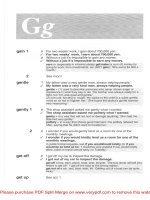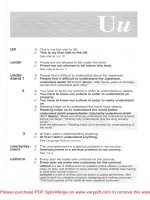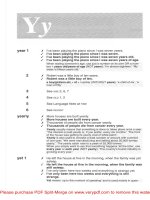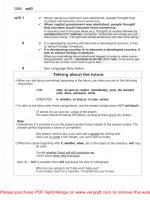Tài liệu Longman Dictionarry of Common Errors_ Part 3 pdf
Bạn đang xem bản rút gọn của tài liệu. Xem và tải ngay bản đầy đủ của tài liệu tại đây (5.27 MB, 18 trang )
358
will
will 1
X When capital punishment was abolished, people thought that
murders will become more numerous.
,/ When capital punishment was abolished, people thought
that murders would become more numerous.
A reporting verb in the past tense (e.g. 'thought') is usually followed by
would/could (NOT will/can). Compare: 'I think she will accept any job
that comes along.' 'I thought she would accept any job that came along.'
2
X If a developing country will become a developed country, it has
to attract foreign investors.
,/ If a developing country is to become a developed country, it
has to attract foreign investors.
When you are talking about what must happen in order to make some-
thing possible, use if ... am/is/are to do sth (NOT will): 'If we are to get
there by six o'clock, we'll have to get a taxi.'
3
See Language Note below
Talking about the future
• Whenyou talk about something happening inthe future, you often use one of the following
conjuctions:
TIME after, as soon as, before, immediately, once, the moment,
until, when, whenever, while
CONDITION if, whether, as long as, in case, unless
• To refer to the future after these conjunctions, usethe present simple tense (NOTwill/shall):
I'll phoneyou as soon as I arrive at the airport.
The planeshould betaking off shortly, as long asthere aren't any delays.
Note:
1 Sometimes it is possible to usethe present perfecttense instead of the present simple. The
present perfect expressesa senseof completion:
Shedoesn't want to buy a car until she's passedher driving test.
Onceyou've madea few friends, you won't feel so lonely.
2 When the clause beginning with if, whether, when, etc is the object of the sentence,will may
be used:
I doubt whether Davidwill still recognizeme.
I don't know when they'll be back.
Also, if ... will is possible when will expressesthe ideaof willingness:
What areyou going to do if she won't helpyou?
If you'll take a seatfor a moment, I'll tell Mr Foxyou're here.
Please purchase PDF Split-Merge on www.verypdf.com to remove this watermark.
win
within 359
wish 1
with 1
within
X We have never won the American team .
./ We have never beaten the American team.
win a game, match, race, competition, election, etc: 'United have won
four of their last five matches.' 'Who won the FA Cup last year?'
beat a person, team or group (in a game, match, race, competition,
election etc): 'They're a good side but I'm sure we can beat them.' '
X I wish you have a wonderful holiday .
./ I hope you have a wonderful holiday.
X I wish you will enjoy your stay here .
./ I hope you will enjoy your stay here.
Use wish that (+ past/past perfect tense) for things that cannot happen
or will probably not happen: 'I wish I hadn't told them my address.' 'I wish
you could stay here longer.'
(=
this will probably not happen)
Use hope that (+ present/present perfect tense) for things that may
easily happen or may easily have happened: 'I hope you've had a
successful trip.' 'We hope you all have a very merry Christmas.'
When wish is used for this meaning, the object is a noun phrase (NOT a
that clause): 'I wish you a safe journey.' 'We'd like to wish you all a very
merry Christmas.'
2
?
I wish to send you a wedding present.
./ I'd like to send you a wedding present.
?
I wish to stay until the end of JUly but I can't.
./ I'd like to stay until the end of July but I can't.
When you tell someone what you want (to do), or ask someone what
they want (to do), use would like or (especially in informal styles) want:
'I'd like to buy a few postcards.' 'What would you like to do tonight?'
Wish is used with this meaning only in formal styles: 'We wish to
apologize for the late arrival of this train.'
3
X I wish that they will stop killing each other .
./ I wish that they would stop killing each other.
X He wishes he can drive a car; taxis are so expensive .
./ He wishes he could drive a car; taxis are so expensive.
When you are thinking about the present or the future, use wish (that) +
would /could/had etc. (NOT will/can/have etc.) 'I wish I knew his
telephone number.' 'I wish I didn't have to go to school tomorrow.'
X I finally opened the can with using a screwdriver .
./ I finally opened the can by using a screwdriver.
To explain 'how' something is achieved, use by doing sth (NOT with):
'The thieves got into the house by climbing through the kitchen window.'
Compare: 'I finally opened the can with a screwdriver.'
2
See CAR 2, TAXI
X She is getting married within a few hours and she feels a bit
nervous .
./ She is getting married in a few hours and she feels a bit
nervous.
X My examinations are within two weeks' time .
./ My examinations are in two weeks' time.
within
=
before the end of the stated period: 'The parcel should be
Please purchase PDF Split-Merge on www.verypdf.com to remove this watermark.
360 wood
arriving within the next five days.' 'Within six years of joining the
company he was Managing Director.'
in
=
at the end of the stated period: 'The doctor wants to see me again in
a week's time.' 'Don't go away. I'll be back in a few minutes.'
wood
X
The coat has a leather belt and three brown wood buttons.
./
The coat has a leather belt and three brown wooden
buttons.
The adjective meaning 'made of wood' is usually wooden (NOT wood):
'Stir the mixture gently with a wooden spoon.'
work 1
X
Without a full-time work, some people think it's not worth living.
./
Without a full-time job, some people think it's not worth
living.
./
Without full-time work, some people think it's not worth
living.
X
I've come to England to do a research work in civil engineering.
./
I've come to England to do research work in civil
engineering.
See Language Note at OCCUPATION
2
X
I got up and got ready to go to my work.
./
I got up and got ready to go to work .
See Language Note at OCCUPATION
3
X
These days a lot of women go to work outside.
./
These days a lot of women go out to work .
X
My wife goes to work outside the house.
./
My wife goes out to work .
See Language Note at OCCUPATION
4
X
I would like to work at an international organization.
./
I would like to work for an international organization .
X
My mother works in a large insurance company.
./
My mother works for a large insurance company .
See Language Note at OCCUPATION
world 1
X
Nepal has one of the highest mountains in all over the world.
./
Nepal has one of the highest mountains in the world •
X
The sewing machine is one of the most widely used products of
the world.
./
The sewing machine is one of the most widely used
products in the world.
superlative + noun + in the world: 'At that time China was the richest
and most powerful country in the world.'
2
X
Pollution is a serious problem in all of the world.
./
Pollution is a serious problem all over the world .
X
Their music is played in every part of the world.
./
Their music is played all over the world .
all over the world
=
everywhere in the world: 'Since joining the newspa-
per, she's travelled all over the world.' 'There will be teams from all over
the world.'
Please purchase PDF Split-Merge on www.verypdf.com to remove this watermark.
worse
worthy 361
worst
worth 1
x
It was the worse journey I had ever made. ,~
./ It was the worst journey .1had ever made.
!~I
X People's lack of responsibility makes the ~ .~~
problem even more worse. ~J2J /
./ People's lack of responsibility makes
A ..~
the problem even worse.
'r~~';'/
bad, worse, (the) worst: 'The medicine just made ((~
me feel worse.' 'It's the worst film I've ever seen.'
rrw
l
!
X The next time I saw her she looked even worst.
./ The next time I saw her she looked even worse.
X The day finished worst than it began .
./ The day finished worse than it began.
See note at WORSE
X The ring has great sentimental worth .
./ The ring has great sentimental value.
X They do not appreciate the worth of life .
./ They do not appreciate the value of life.
Worth is usually used as a preposition: 'A four-bed roomed house in the
middle of town is probably worth about £200,000.'
The noun related to worth is value: 'The current value of property is very
low compared with this time last year.'
Compare: 'That watch is worth fifty pounds.' 'That watch has a value of
fifty pounds.'
2
X The missing ring worths about two thousand pounds .
./ The missing ring is worth about two thousand pounds.
X A holiday doesn't worth all the effort it takes preparing for it.
./ A holiday isn't worth all the effort it takes preparing for it.
be worth £20lvery little/a fortune etc: 'These old computers aren't
worth much nowadays.'
3
X It's also worth to visit the north of England if you have time .
./ It's also worth visiting the north of England if you have time.
X The museum was certainly worth to see .
./ The museum was certainly worth seeing.
it's worth doing sth; sth is worth doing (NOT to do): 'It's worth
remembering that these old cars can be very expensive to run.'
worthwhile
X The film reviews are always worthwhile looking at.
./ The film reviews are always worth looking at.
it's worth/worthwhile doing sth: 'It might be worth having one or two
copies made.'
'Is-it
worthwhile talking about it now, or shall we leave it
until our next meeting?'
sth is worth doing (NOT worthwhile): 'Some of these so-called
professional teams aren't worth watching.'
Cqmpare: 'Was the long drive up to Scotland really worthwhile?'
worthy
X It's not worthy taking your own car .
./ It's not worth taking your own car.
X The cathedral is certainly worthy to be visited .
./ The cathedral is certainly worth visiting.
Please purchase PDF Split-Merge on www.verypdf.com to remove this watermark.
362 would
it's worth doing sth; sth is worth doing (NOT worthy): 'Do you think
it's worth having the engine tuned?' 'The letter isn't worth worrying
about.'
would 1
X
If I would live in the countryside, I would be much healthier.
,/
If I lived in the countryside, I would be much healthier.
When you are talking about the present or the future and you imagine
something that is untrue or unlikely, use the past tense ('lived') in the if
clause (NOT would): 'If I knew her address, I'd send her a postcard.' 'If I
won a lot of money, I'd buy a new car.'
2
X
If you would have caught the earlier train, we could have
travelled together.
,/
If you had caught the earlier train, we could have travelled
together.
When you are talking about the past and you imagine something that is
impossible, use the past perfect tense ('had caught') in the if clause (NOT
would have): 'If he hadn't got on the plane, he would still be alive.'
3
X
If you would have any more questions, I'll do my best to answer
them.
,/
If you should have any more questions, I'll do my best to
answer them.
When you are talking about the present or the future and you imagine
something that is possible but unlikely, use if ... should (NOT if .._
would): 'If anyone should need me, I'll be back in half an hour.'
wound
X
Only the driver was wounded in the accident.
,/
Only the driver was injured/hurt in the accident.
See note at DAMAGE 1
wrapping
X
Manufacturers should dispense with all unnecessary wrapping.
,/
Manufacturers should dispense with all unnecessary
packaging.
wrapping (also wrappings)
=
paper or paper-like material that is put
round something: 'I wanted to tear off the wrapping and see what was
inside.'
packaging
=
the container or material that something is placed in by a
manufacturer, especially to protect it or make it look attractive:
'Packaging should be biodegradable and kept to a minimum.'
Note that both wrapping and packaging are used in connection with
food: 'Somewhere on the packaging/wrapping there should be a date
stamp.'
write 1
X
I'd like to apologize for not having written you before.
,/
I'd like to apologize for not having written to you before.
In British English you write to a person or place (WITH to): 'Wingate
wrote to his father, asking for more money.'
In American English to is optional: 'I'll write (to) you and give you all the
latest news.'
2
X
Dear ... I write to you to ask for your advice.
,/
Dear ... I am writing to you to ask for your advice.
Please purchase PDF Split-Merge on www.verypdf.com to remove this watermark.
wrong 363
wrong
For actions which are happening at the time when they are mentioned,
use the present progressive tense (NOT the present simple): 'I'm writing
to tell you that I'll be coming to London next Thursday.'
)<
The belief that Spanish is easy to learn is wrong.
.I The belief that Spanish is easy to learn is mistaken.
To describe a belief or idea that is wrong although people do not know it
is wrong, use mistaken: 'Some people have the mistaken idea that cats
need to drink milk.' 'I'm afraid you must be mistaken.'
Please purchase PDF Split-Merge on www.verypdf.com to remove this watermark.
year
1
x
I've been playing the piano since I was seven years.
./
I've been playing the piano since I was seven .
./
I've been playing the piano since I was seven years old .
./
I've been playing the piano since I was seven years of age .
When stating someone's age, use just a number on its own OR a num-
ber + years old/years of age (NOT years): 'I'm almost eighteen.' 'My
sister is fifteen years old.'
2
X
Robert was a little boy of ten years.
./
Robert was a little boy of ten .
a boy/girl/son etc + of + number (WITHOUT years): 'a child of six', 'a
man of fifty'
3
See AGE 2, 6, 7
4
See OLD 1,2
5
See Language Note at TIME
6
See RECENT
yearly
X
More houses are built yearly.
./
More houses are built every year .
X
Thousands of people die from cancer yearly.
./
Thousands of people die from cancer every year .
Yearly usually means that something is done or takes place once a year:
'The interest is paid yearly or, if you prefer, every six months.' 'The front
of the house was getting its yearly coat of white paint.'
Yearly is also used to connect a total number or amount with a period
of one year: 'We were manufacturing and selling about 20,000 tonnes
yearly.' 'The yearly catch rose to a peak of 52,000 tonnes.'
When you simply want to say that something happens 'all the time', use
every year or each year (NOT yearly): 'The country's tourist industry is
growing every year.'
yet 1
X
He left the house at five in the morning, when the family was yet
asleep.
./
He left the house at five in the morning, when the family was
still asleep.
X
I've only been here two weeks and everything is strange yet.
./
I've only been here two weeks and everything is still
strange.
Yet means 'up to the moment of speaking' and is used mainly in ques-
Please purchase PDF Split-Merge on www.verypdf.com to remove this watermark.









